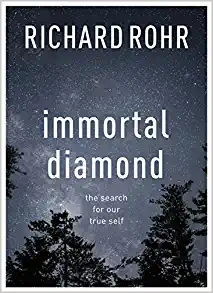Tonight, we will be discussing Chapter 6 “If It Is True, It Is True Everywhere” and Chapter 7 “Enlightenment at Gunpoint” of Richard Rohr’s book Immortal Diamond: The Search for Our True Self. In many ways, chapter 7 is a response to Ecclesiastes. In Ecclesiastes, death is the great evil that makes everything meaningless. Whether a person was wise or foolish or righteous or wicked ultimately doesn’t matter, because we’re all dead in the end. e.g., Eccl. 9:1-9. For the Speaker, nothing is stronger than death because death envelops and destroys all meaning.
For Rohr (and hopefully for all Christians) death is not to be feared but (almost) welcomed. Whatever part of the False Self remains in control at death, we will finally and necessarily let go of. It is “enlightenment at gunpoint.” p.141. By our dying to the False Self (prior to our physical death), we come to learn that the False Self has “no substance, no permeance, no vitality, only various forms of immediate gratification.” p.143. It is here that we learn that death is not the end of the True Self. As Paul writes: “But if we have died with Christ, we believe that we shall also live with him.” Rom. 6:8. And by this dying and rising we also learn that “Love is stronger than death.” p.142. Ecclesiastes was right, but only in regards to the False Self, not to who we truly are in Christ Jesus.
The other broader point made by Rohr goes back to the Franciscan understanding of the Incarnation which begins with the writing of Bl. John Duns Scotus (1266-1308). (Duns Scotus was born in Britain and educated at Oxford which would make him Anglican.) The question with which Duns Scotus is concerned is whether Jesus’ Incarnation was prompted to somehow remedy human sin (as most of Christianity teaches) or was the Incarnation the entire point of all creation to begin with? Duns Scotus asserted that the Incarnation was the reason for creation itself, not just a correction to the Fall. The Incarnation was not a Plan B because Adam sinned, but was always from the before the beginning Plan A to physically demonstrate God’s perfect love for creation and God’s perfect and absolute freedom to love creation. For the Franciscans, the Cross doesn’t change God’s opinion of us (as damnable sinners who need to be redeemed), rather it changes our opinion about God (not as a deity demanding a sacrifice but as an eternally loving reality that desires communion with us despite our brokenness). Because Duns Scotus’ perspective was firmly grounded in the Scriptures (John 1:1-18, Col. 1:15-23, Eph. 1:3-14) the Church has allowed his alternative understanding of the reason for the Incarnation and the Cross to remain part of the orthodox Christian teachings. Two good articles on Duns Scotus’s view of the Incarnation are by Philip Yancy in Christianity Today (1.10.2008) and by Richard Rohr on his daily blog (2.12.2016).
Dinner is at 6. The menu is Chicken Lettuce Wraps. Discussion about 6:45. Hope to see you here.
For he has made known to us in all wisdom and insight the mystery of his will, according to his purpose which he set forth in Christ 10 as a plan for the fulness of time, to unite all things in him, things in heaven and things on earth.
Ephesians 1:9-10

